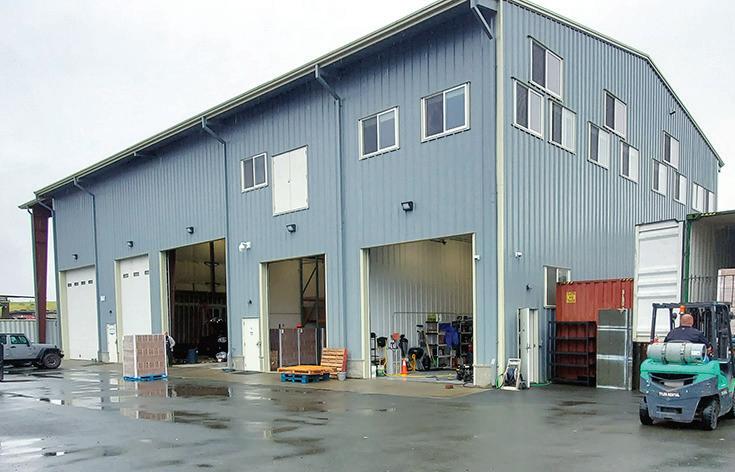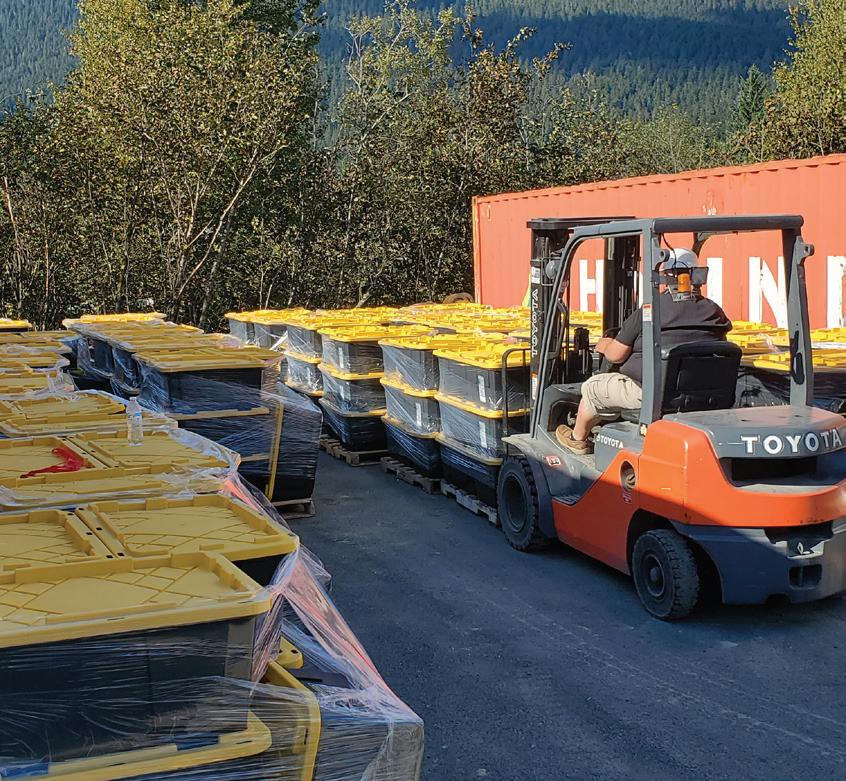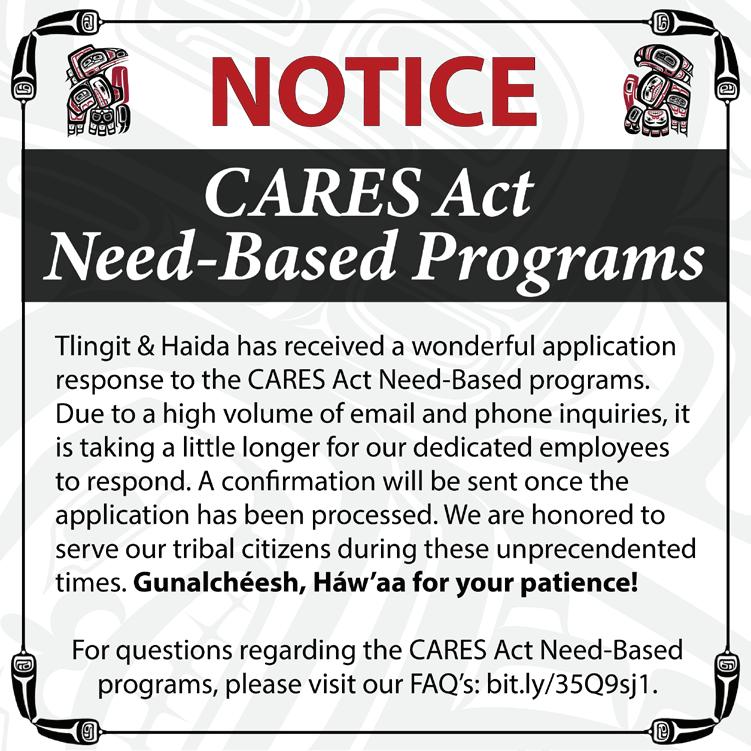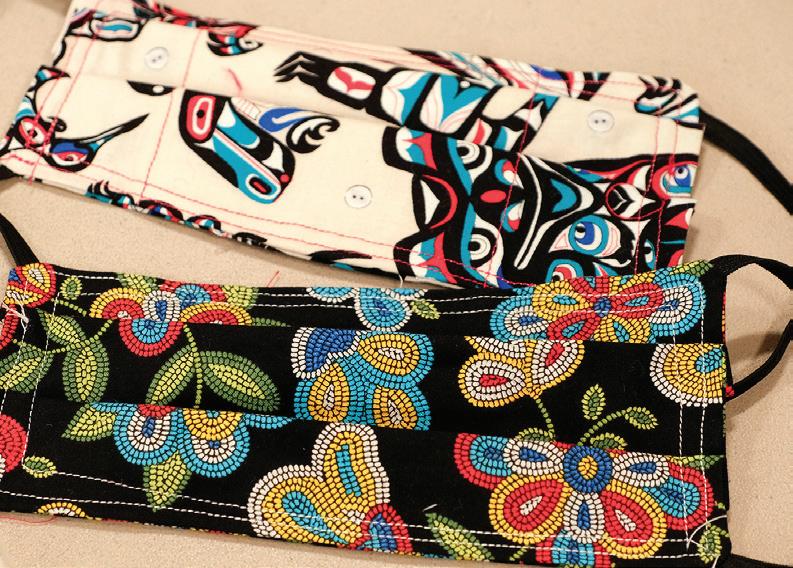
8 minute read
CARES Act Projects & Highlights
2020 Highlights
Facilities Purchased
Acquired property and completed facility upgrades to establish the Tribal Emergency
Operations Center (TEOC) headquarters. Acquired properties to establish three non-congregate shelters (Alaway Avenue, Allen Court and Haven House).
Building Retrofits & Upgrades
Retrofitted bathrooms, entrances and air systems of Tlingit & Haida’s buildings.
Education & Supplies
Provided Hope & Resiliency counseling sessions to employees. Procured personal protective equipment (PPE), hygiene and sanitation supplies, and other disaster response tools for the Tribe and registered communities. Purchased fabric, sewing machines and other supplies for mask sewing project. Provided Tlingit Haida Tribal Business Corporation with PPE to meet sanitation and hygiene requirements for their employees, and COVID-19 safety education to employees.
Personnel
Hired 21 employees to administer the CARES Act Need-Based programs.
Equipment
Purchased vehicles and additional equipment for the TEOC. Purchased logistics warehouse equipment for storage of emergency response supplies. Purchased Conex boxes, generators and other supplies to deploy COVID-19
Community Care Kits to 21 communities.
Direct Support Funding
Allocated $1 million to Airlift Northwest which provided vital air medevac service to the communities of Craig, Haines, Hoonah, Kake, Klawock, Metlakatla, and Skagway. » Medevac service is a crucial life and death service for our tribal citizens in rural communities that do not have adequate medical emergency care systems in place and have limited transportation options to receive the care they need. Allocated $8 million in funding for CARES Act Need-Based programs. Allocated $50,000 in funding for the Elderly Emergency Assistance program. Allocated $1M in funding for the CARES Act Small Business Grant program.
Information & Technology
Secured and implemented cloud-based accounting software for Finance department employees to work remotely during the Coronavirus pandemic. Provided updates to TribeVue client database management system. Contracted with Juneau Radio Center and KCAW to produce and air Public Service
Announcements (PSAs) with Coronavirus health and safety messaging. Purchased additional computer equipment to create the infrastructure for employees to work remotely. Issued Internet, phone and data reimbursements to employees for connectivity costs for employees working remotely.
Tribal Emergency Operations Center
Tlingit & Haida’s very first effort was to activate a Tribal Emergency Operations Center (TEOC) to serve as a regional hub for the Tribe's response to the COVID-19 pandemic and implement mitigation strategies to support our communities. The TEOC’s structure is based on the National Incident Management System (NIMS) Incident Command System (ICS) which addresses the four phases of emergency management (mitigation, preparedness, response and recovery).
The TEOC’s mission is to “safeguard the health and well-being of Tlingit & Haida employees, tribal citizens, communities and neighbors” and it will coordinate the Tribe’s emergency response management with all tribal, federal, state and local jurisdictions. The objectives of the TEOC are to work in the best interest of Tlingit & Haida’s employees, tribal citizens, communities and neighbors to: Slow/stop the spread of Coronavirus disease 2019 (COVID-19). Take actions to bridge the gap between supply and tribal consumers in the event pre-existing stores become depleted and/or supply chain delays, difficulties or interruptions occur. Mitigate the economic impact to Tlingit & Haida and its employees from COVID-19. Provide public information related to the COVID-19 pandemic. In August 2020, Tlingit & Haida purchased a facility located at 5750 Concrete Way in Juneau, Alaska to serve as the TEOC headquarters. The new headquarters house the Tribal Office of Emergency Management, as well as a logistics warehouse and the Operations team. The facility provides the TEOC the space, tools and technology necessary to stay in communication with partner tribal communities, as well as the ability to monitor the status of the Coronavirus and its impact on the world, nation, state, and our tribal communities. It also allows the Tribe to respond quickly to all hazards that may threaten tribal citizens.
COVID-19 Community Care Kits
Working closely with Tlingit & Haida Community Councils and Southeast Alaska IRA tribes, the TEOC set to task ordering supplies for the deployment of COVID-19 Community Care Kits. Although there were initial challenges securing items due to supply chain shortages throughout the nation, the TEOC was able to secure enough emergency response supplies. The COVID-19 Community Care Kits included a three-month supply of basic necessities to serve as a starter kit to support communities in their efforts to prevent the spread of the Coronavirus or prepare for a future disaster.

Deployed COVID-19 Community Care Kits to 21 communities. Kits included: PPE,
Meals Ready-to-Eat (MREs), dehydrated food, generators, dehumidifiers, 50 ft. extension cords, 10 Gauge 100 ft. extension cords, first responder kits, 50 ft. LED string lights, LED work lamps, 3-in-1 dolly, rolling carts, 10x10 tarps, heavy duty shelves, large plastic totes, shelf stable food (rice, beans, sugar, salt and baking soda), tables and chairs.
Non-Congregate Shelters
The Reentry & Recovery department has been working diligently on the construction and remodel of three reentry non-congregate shelter projects in Juneau, Alaska. The objective of these projects is to mitigate the spread of COVID-19 and increase public safety by reducing recidivism. With current statistics showing that citizens returning from incarceration are 10 times more likely to experience homelessness, providing non-congregate shelters and supportive services to the reentry population keeps the vulnerable out of congregate shelters where social distancing is difficult. The floor plan layouts for each facility include mitigation strategies providing individual bedrooms for each resident, as well as a quarantine and isolation space with the ability to further separate living quarters in the event of a COVID-19 outbreak.
In addition to creating a safe space that keeps our reentry population out of congregate shelters, these programs will provide cultural and peer-supported reentry and recovery programming, employment and training opportunities, and intensive case management. Although the non-congregate shelters are located in Juneau, they will support incarcerated citizens from other communities that must remain in Juneau to meet probation/parole requirements upon their release. Interstate transfers for tribal citizens incarcerated out-of-state will also be considered to assist in their homecoming to be closer to family and cultural resources. Residents will be housed for up to two years and will pay rent and any other financial obligations such as child support, legal fees or restitution. An important goal of these programs is to close the gap between release from incarceration and access to supportive services. Eligibility will be limited to those that are currently incarcerated in a prison or halfway house. Those within three months of their release date are encouraged to apply. All non-congregate shelter programs will be available to Native and non-Native applicants, although Native applicants and parents of Native children will have preference.
Non-Congregate Shelters (Cont.)
The properties are currently identified by location, but will be named in a traditional manner in consultation with tribal Elders to ensure the names honor the purpose of the shelters and our traditional tribal values. Acquired property on Allen Court to establish a 12-resident, non-congregate, lowbarrier shelter program for formerly incarcerated males that may otherwise struggle to find housing, including those with sexual offenses. Acquired property on Alaway Avenue to establish a 15-resident, non-congregate shelter program to support formerly incarcerated males and will include a focus on lifting up our formerly incarcerated fathers. Acquired Haven House, which is a 5-resident, non-congregate shelter program to support women coming from prison or residential treatment.
CARES Act Financial Assistance Programs
At the core of Tlingit & Haida is our safety net of services. While long-standing services, such as General Assistance and Temporary Assistance for Needy Families, were critical programs that helped our tribal citizens and families through the COVID-19 pandemic, federal funding restrictions limit the service area to Southeast Alaska. Understanding many of our tribal citizens, including those who live outside Southeast Alaska, were impacted by the pandemic in some way, Tlingit & Haida used a portion of its CARES Act funding to launch three relief programs - CARES Act Need-Based programs (Education & Retraining and Housing & Utilities programs) and CARES Act Small Business grant. These programs provided aid to tribal citizens and tribally-owned businesses impacted by the pandemic.
Housing & Utilities Program
The Housing & Utilities program provided a one-time assistance of up to $500 to assist families financially impacted by the COVID-19 pandemic who had eligible housing and utility expenses. Provided $1,347,500 in total assistance which served 2,695 households.

Education & Retraining Program
The Education & Retraining program provided a one-time assistance of up to $500 to assist families with unexpected education and retraining expenses due to impacts from the COVID-19 pandemic.
Provided $508,999 in total assistance which served 1,018 households.
Small Business Grant
The Small Business Grant program provided up to $5,000 in grants to qualifying tribal citizens who owned a business, were 50% owner of a small business with 50 employees or less, and could demonstrate financial hardship that related to COVID-19. Provided $649,624 in total assistance to 130 tribally-owned small businesses.
Mask Sewing Project
In an effort to continue to keep our tribal citizens safe during the COVID-19 pandemic, a small group of tribal citizens and staff established a mask sewing production area in the Elizabeth Peratrovich Hall to make handmade masks. The sewing supplies were originally purchased and donated by Tlingit & Haida’s 477 Division and later funded by a small grant award received from the State of Alaska. Produced double-layered cloth masks which feature tribal-inspired designs. Distributed masks to staff and tribal citizens based on need. Donated masks to the Alaska Pribilof Island Association and Ketchikan Indian
Community's Elders. Distributed masks to Delegates and to the Back to School Backpack event for tribal youth.


Administration Reports











